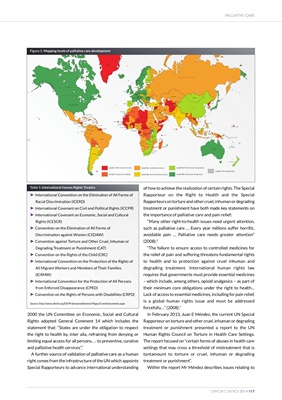
denial of pain relief.10 Mr Méndez comments on negligent
conduct that "constitutes ill-treatment if it leads to severe
pain and suffering". He describes how many countries do not
make adequate provision for the supply of controlled
medicines required to treat moderate and severe pain. He
draws on reports from the World Health Organization
(WHO) and from Human Rights Watch that describe
inadequacy of pain treatment in countries from the
developing and the developed world - that 32 countries in
Africa have almost no supplies of morphine; that one-third of
patients in the United States do not receive adequate pain
treatment. He identifies the obstacles to effective pain
management recognizing that in general: "denial of pain
treatment involves acts of omission rather than commission
and results from neglect and poor government policies,
rather than from an intention to inflict suffering".
In concluding his report the Special Rapporteur on torture
calls on all states to:
"Ensure full access to palliative care and overcome current
regulatory, educational and attitudinal obstacles that restrict
availability to essential palliative care medications, especially
oral morphine."
"Develop and integrate palliative care into the public health
system by including it in all national health plans and policies,
curricula and training programmes and developing the
necessary standards, guidelines and clinical protocols."10
General comment 14
General comment 14
7 describes the normative content of
article 12 of the ICESCR and distinguishes between the
PALLIATIVE CARE
118 CANCER CONTROL 2014
Table 2: Obligations under the Committee on Economic, Social and Cultural Rights
General comment14
Core obligations
To ensure the right of access to health
facilities, goods and services without
discrimination
To ensure access to minimum essential
food which is nutritionally adequate and
safe, freedom from hunger
To ensure access to basic shelter, housing
and sanitation, and an adequate supply of
safe and potable water
To provide essential drugs, defined by the
WHO as Essential Drugs
To ensure equitable distribution of all
health facilities, goods and services
To adopt and implement a national public
health strategy and plan of action
Obligations of comparable priority
To ensure reproductive, maternal and
child health care
To provide immunization against the
major infectious diseases occurring in the
community
To take measures to prevent, treat and
control epidemic and endemic diseases
To provide education and access to
information concerning the main health
problems in the community
To provide appropriate training for health
personnel, including education on health
and human rights
Core obligation in the context of
palliative care
To ensure the right of access to palliative
care without discrimination
To provide essential palliative care drugs,
as defined by WHO
To ensure equitable distribution of
palliative care services
To adopt and implement a national
palliative care strategy and plan of action
To provide education and access to
information palliative care services in the
community
To provide palliative care training for
health personnel
The Prague Charter call to governments
4. Governments should ensure the
integration of palliative care into health
care systems at all levels
2. Governments should ensure access to
essential medicines, including controlled
medications, to all who need them
1. Governments should develop and
adopt health policies that address the
needs of patients with life-limiting or
terminal illnesses
3. Governments should ensure that health
care workers receive adequate training
on palliative care and pain management
at undergraduate and subsequent levels